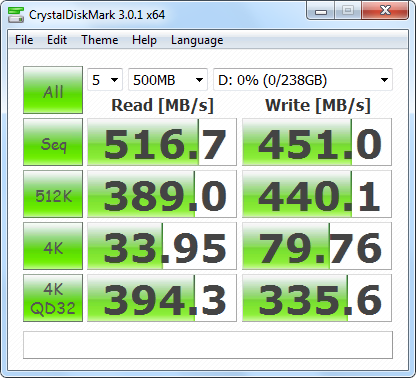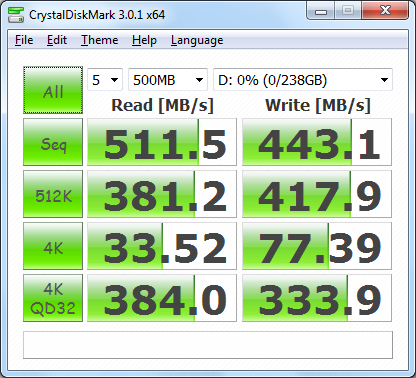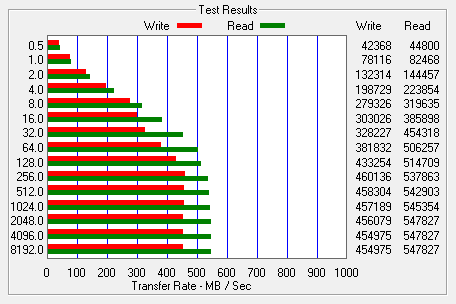The test system used in this review was an HP 8200 Elite. The computer came equipped with an Intel Core i5-2400 CPU, 4GB of DDR3 1333MHz memory, Seagate Barracuda 7200.12 ST3250312AS 250GB SATA 6 Gb/s hard drive, NVIDIA Quadro FX580 512MB PCIe graphics card and an Intel 82579-LM gigabit network card. For the operating system, I installed a fresh copy of Windows 7 Enterprise.
To test the performance of the Plextor PX-256M5P with the new Xtreme firmware, I ran a series of benchmarks using CrystalDiskMark 3.0.1, ATTO Disk Benchmark 2.46, AS SSD, Anvil's Storage Utilities and Iometer.
CrystalDiskMark 3.0.1:
First, I ran a few quick tests using CrystalDiskMark. This benchmark tool measures the performance of a storage device by testing its sequential read and write speeds as well as its random read and write speeds using blocks 512K and 4K in size.
According to Plextor, the PX-256M5P is capable of reading at 540 MB/s and writing at 460 MB/s with the new Xtreme firmware. While the drive came up a bit short of these numbers, you can see that there are some definite performance gains, especially in regards to its sequential write and random read speeds.
ATTO Disk Benchmark 2.46:
I also used ATTO Disk Benchmark to test the PX-256M5P's sequential read and write speeds. The tests are run using blocks ranging in size from 0.5KB to 8192KB and the total length set to 256MB.
The PX-256M5P was slightly faster when tested with the new Xtreme firmware. This time around, the drive's read speeds topped out at about 550 MB/s and its write speeds at 462 MB/s.
AS SSD:
AS SSD is a relatively new benchmark designed specifically for solid state drives. The application contains five synthetic tests used to determine the sequential and random read and write performance of a drive.
The PX-256M5P did not perform as well in AS SSD's sequential read and write tests with the new Xtreme firmware. Nevertheless, its random read and write performance was better, especially when doing random reads at high queue depths.







